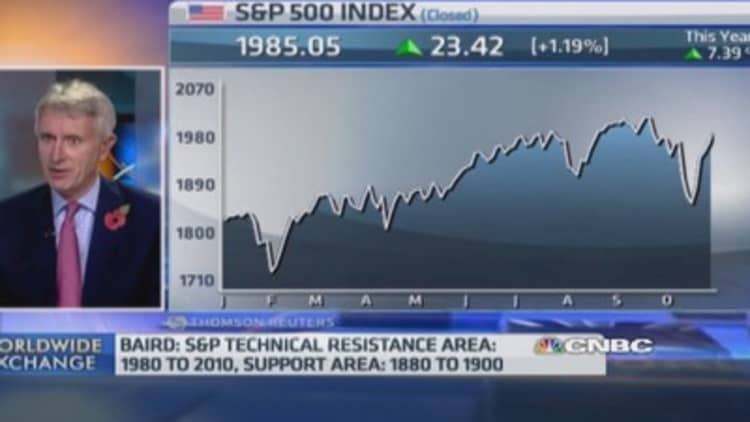Their governors might have hated Obamacare, but their attorneys general just love that Obamacare money.
Eleven states that chose not to set up their own health-care marketplaces filed court papers on Monday supporting the legality of federal subsidies that help their residents buy insurance plans through HealthCare.gov.
Those subsidies are being challenged by four lawsuits that claim only enrollees of health-care exchanges set up by an individual state can get that financial assistance, in the form of tax credits.

The states that supported the HealthCare.gov subsidies include a number of so-called "Red" states that had been led by Republicans who are opposed to the Affordable Care Act (ACA). However, all of the AGs who signed the new brief are Democrats.
The states' support came in a legal brief filed in the U.S. Court of Appeals for the District of Columbia Circuit. The full circuit is scheduled to reconsider a 2-1 decision by a judicial panel last summer that ruled the subsidies are illegal under the ACA.
Read MoreKeep waiting: Obamacare threat
That decision was based on a close reading of the ACA, which explicitly authorizes financial assistance for customers of state-run exchanges. It does not do so for people enrolled in the federal exchange, HealthCare.gov.
In Monday's filing, Virginia, Maine, Mississippi, North Carolina and Pennsylvania said they "elected to forgo establishing their own exchange under the ACA with the understanding that relying on a federally facilitated exchange would not harm state citizens or interfere with state insurance markets."
Read MoreExcited for Obamacare enrollment? Meh
"Sharing that same understanding, the states of Arkansas, Delaware, Iowa, Illinois, New Hampshire, and New Mexico" elected to have HealthCare.gov sell insurance in their states while retaining responsibility for "certain core functions" of the marketplace, the filing noted.
Seven other states that signed the brief—California, Hawaii, Maryland, Oregon, New York, Vermont and Washington—are running their own exchanges.
All 18 states said if the "erroneous" claims that HealthCare.gov subsidies are illegal" were adopted, it would deprive millions of low- and moderate-income Americans of billions of dollars in federal premium assistance needed to buy health insurance, and it would disrupt State insurance markets throughout the United States."
"There is no plausible reason to believe that Congress intended such a draconian result," the brief said.
Experts agree if the subsidies were removed for federal exchange enrollees, many of them either would not or could not afford to buy health insurance. The subsidies would continue in states that do run their own exchanges.
"This brief is very important," said Timothy Jost, a leading Obamacare supporter and professor of health law at Washington and Lee University.
"It shows that states understand and are concerned about the severe damage that could be inflicted on their insurance markets if plaintiffs prevail in the tax credit cases," he said.
Read MoreA tale of two Obamacare price changes
"This is not a red/blue issue, but rather an issue that has been raised by a radical fringe of ACA opponents, and that Republicans as well as Democrats, whatever their position on the ACA, understand that their citizens will be seriously harmed if the premium tax credits are removed without further changes in the law."
But those who support challenging the subsidies noted the ACA is silent on the issue of granting people financial help when they buy on a federal exchange.
They say if the Obama administration wants to grant those credits for federal exchange enrollees, it should ask Congress to amend the law. However, doing so would be unlikely, at best, given Republican control over the House, and possibly of the Senate after Tuesday's elections.
Those subsidy challengers also point to a speech ACA architect Jonathan Gruber gave in 2012, when he said, "I think what's important to remember politically about this, is if you're a state and you don't set up an exchange, that means your citizens don't get their tax credits."
"But your citizens still pay the taxes that support this bill. So you're essentially saying to your citizens, you're going to pay all the taxes to help all the other states in the country," he said in that speech. "I hope that's a blatant enough political reality that states will get their act together and realize there are billions of dollars at stake here in setting up these exchanges, and that they'll do it."
Michael Cannon, director of health policy for the libertarian Cato Institute, has said the Obama administration, by relying on an IRS rule that authorizes subsidies for HealthCare.gov enrollees, is "breaking the law by taxing, borrowing, and spending billions of dollars contrary to the clear and unambiguous language of the" Affordable Care Act.
The Washington, D.C., appeals circuit is just one court where challenges to the HealthCare.gov subsidies have been mounted. Lawsuits were filed in three other federal district claiming the tax credits are illegal.
"All these attorneys general are doing is restating what everyone else on the government's side says, which is that the statute was not clear," Cannon told CNBC. "But two out of three standing opinions in this case say it was clear."
Cannon was referring to the fact that, in addition to the D.C. circuit, a federal district judge in Oklahoma said in September the subsidies were illegal. Another federal circuit appeals court, in Virginia, has said the subsidies are legal.
On Friday, the justices of the U.S. Supreme Court are scheduled to consider a petition that they take the issue out of the lower courts and decide it once and for all, without much further delay.
Sam Kazman, general counsel of the Competitive Enterprise Institute, which has sponsored the legal challenges to the subsidies, said Monday, "The need for a quick and final resolution of the subsidy question is undeniable."
"It affects nearly every person and company across the country, and that resolution can only come from the Supreme Court, he said."


